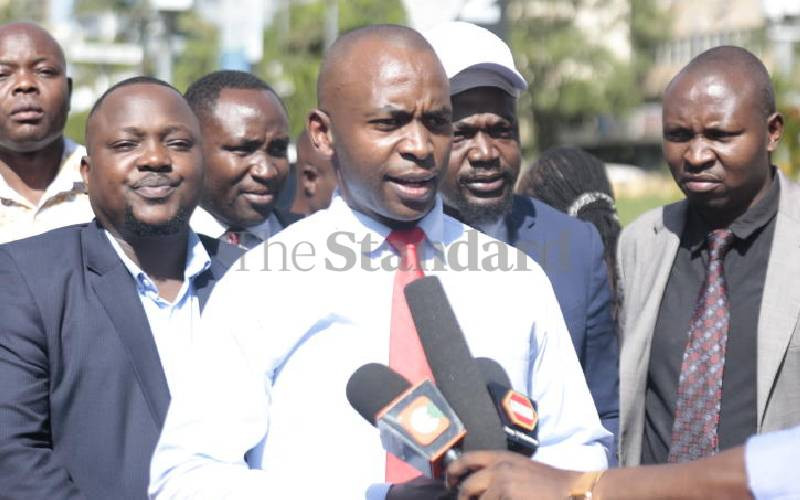By JUMA KWAYERA
KENYA: The push to devolve public services is coming up against resistance from health workers, with reservations about the capacity and preparedness of regional authorities to execute the functions ceded by the national Government.
The newly registered Kenya National Union of Nurses (Knun) has issued a 21-day strike notice that expires on August 2, in an effort to compel the central Government to delay devolution of health services until county governments are up and running. The nurses want the process staggered over three years.
They also want a Health Service Commission set up to match those of other essential services such as the National Police Service Commission, Judicial Service Commission and Parliamentary Service Commission. They say this will reduce bureaucracy and increase transparency in the Health Ministry. The threat to withdraw services comes at a time county governors are locked in an acrimonious tussle with the central Government over the control of local resources.
Wide berth
Notably, nurses will be the first cadre of civil servants to give devolution a wide berth citing tyranny of regional chief executives. The protest by the more than 15,700 health-workers gives the Executive and Members of the National Assembly new ammunition to hit out at senators and governors, who are accused of usurping the powers of the President.
Last month, the Executive ordered the fast tracking of devolution of ministries without regard to the timelines provided for the Constitution.
Health services were to be devolved in three years, but the period has been contracted to just a few months, which has nurses and doctors in public service worried.
MPs and a section of the Executive reportedly favour centralised authority and for the past two months when each of the regional governments were unveiling their budgets have come under attack for allegedly seeking complete financial autonomy from the central Government.
On the flipside, the nurses drawn from Knun, Kenya Progressive Nurses association and the National Nurses Association will give the 47 governors and senators renewed impetus to demand more funding from the central Government to finance their budgets. The governors complain that they are under-resourced financially to hire requisite staff.
As the nurses plan industrial action, The Standard On Saturday has learnt that the resistance to the transfer of health services to regional governments is receiving backing among doctors, clinical nurses and senior civil servants in the national government wary of ability of the governors to oversee such sensitive docket.
Although the law gives county public service the liberty to source 30 per cent of its staff locally, there are concerns that some governors plan to overhaul staffing, a move that has generated jitters that civil service seconded by the central Government will be sacked. The nurses’ fears come on the back of county advertising positions without consideration to their human resource needs. “We are not asking for more money or allowances. Reason must prevail.
When the decision to transfer health was made we were not accorded an opportunity to give our in-put. We were ambushed and since we are the implementers of devolution we are concerned that if the powers to pay health-workers are left to the county authorities, the heath sector will collapse,” reckons Knun Chair Jophinus Musundi.
Correspondence in our possession indicates that nurses have been in communication with the ministries of Devolution, Health, Labour, the National Assembly and Senate Speakers, the Public Service Commission and the Attorney General. However, the officials complain they have not received assurance or conclusive feedback to their petition.
Situation worse
Stay informed. Subscribe to our newsletter
Chief Nursing Officer in the Ministry of Health Chris Rakuom acknowledges talks have taken place, but will not divulge details. “If we task the counties with human resource management while emoluments are left to the central Government, the situation might be worse than they are anticipating.
A decision has to be made if the centre or periphery will handle health matters. It cannot be shared,” Mr Rakuom points out.
In the strike notice dated July 5, the nurses want their salaries and welfare to be handled by the central Government. They also want the national Government to oversee the hiring of 12,000 maternity nurses and 30 nurses per county to ensure merit and to pre-empt the prospect of governors hiring their kin and cronies.
The Chair of Transition Authority Kinuthia Wamwangi, who is tasked with overseeing the transfer of some functions of central Government to regional authorities, acknowledges the concerns of the nurses. “It is a matter we are consulting over until a workable solution is arrived at.
However, for the time being, it has been agreed that issues to do with personal emoluments will be handled by the national Government for the next six months,” says Mr Wamwangi. The Standard On Saturday has learnt the issue was a subject of intense discussion on Wednesday during an inter-government agency meeting and later when Transition Authority senior officials met principal secretaries and their technical staff at the Serena Hotel. Prior to the last General Election, there was a flurry of correspondence involving Knun, the Ministry of Health and Treasury in which all the parties agreed that some counties lacked a revenue base that would enable them to stand on their own.
The disparities in resource endowment, explains Mr Musundi, imply most counties will struggle to provide standard services. Obuya Obengo, head of Kenyatta National Hospital Medical Chapter of Kenya Union of Domestic, Hotels, Educational Institutions, Hospitals and Allied Workers says nurses are worried of the immense powers bestowed on the governors.
“We know that county governments are still at their infancy. Their revenue bases are narrow. They will be getting their revenue from central governments, taxes and grants. Health-workers are not sure whether counties will be paid as they are not sure where money will come from,” says Mr Obengo.
 The Standard Group Plc is a
multi-media organization with investments in media platforms spanning newspaper
print operations, television, radio broadcasting, digital and online services. The
Standard Group is recognized as a leading multi-media house in Kenya with a key
influence in matters of national and international interest.
The Standard Group Plc is a
multi-media organization with investments in media platforms spanning newspaper
print operations, television, radio broadcasting, digital and online services. The
Standard Group is recognized as a leading multi-media house in Kenya with a key
influence in matters of national and international interest.
 The Standard Group Plc is a
multi-media organization with investments in media platforms spanning newspaper
print operations, television, radio broadcasting, digital and online services. The
Standard Group is recognized as a leading multi-media house in Kenya with a key
influence in matters of national and international interest.
The Standard Group Plc is a
multi-media organization with investments in media platforms spanning newspaper
print operations, television, radio broadcasting, digital and online services. The
Standard Group is recognized as a leading multi-media house in Kenya with a key
influence in matters of national and international interest.








